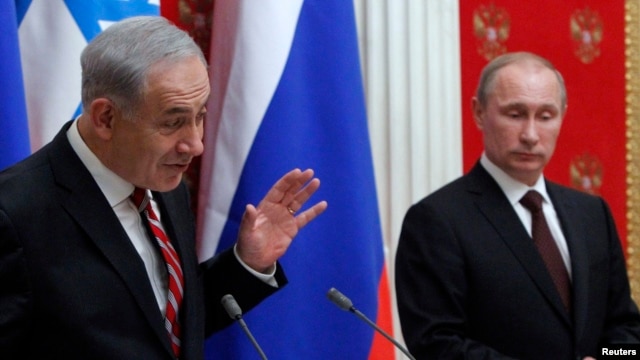
MOSCOW — Israeli Prime Minister Benjamin Netanyahu left Moscow on Thursday after failing in a last minute attempt to move Russian President Vladimir Putin away from backing a Iranian nuclear deal taking shape in Geneva.
After four hours of talks in Moscow, Russia’s leader told reporters, “We, in Russia, have an optimistic view on the Iranian nuclear problem."
The Israeli leader faced an uphill battle in Moscow.
Russia is a northern neighbor of Iran and is known for sitting on the fence about Iran’s nuclear program.
On Monday, Putin talked by telephone with Iranian President Hassan Rouhani. Afterwards, a Kremlin statement said: “Putin stressed that there is now a real chance to find a solution to this long-standing problem.”
Israel supports tighter economic sanctions and total dismantlement of Iran’s nuclear program. In Moscow, Netanyahu tried flattery, publicly praising Putin for brokering a chemical weapons disarmament deal for Syria. He argued that Russia should now try to negotiate a similar nuclear disarmament deal for Iran.
“In the case of Syria, Russia and other powers quite justifiably insisted on full the disarmament of Syria," he said at the news conference. At the Geneva talks, the United States, Russia, China, France, Britain and Germany appear to be shaping a deal that would allow Iran to keep low level uranium enrichment capacity, under international controls.
While the Kremlin says it does not want Iran to get a nuclear bomb, Russia does not share Israel’s insecurity over the issue. Russia has 8,500 nuclear warheads. Some Russians say they do not feel threatened if Iran has one or two nuclear bombs.
George Mirsky, a Mideast expert at Russia’s Academy of Sciences, recalls hearing a Russian diplomat talk a few months ago at a Foreign Ministry conference here in Moscow.
“One of the officials said, quite outright, that it is better to have a nuclear Iran, than a pro-American Iran,” Mirsky recalled. “Can you imagine this? Better a nuclear Iran for Russia, than a pro-American Iran. Because, after all, Russia can never be afraid of Iranian nuclear weapons.”
But Russia does fear the nonconventional weapons that Iran could use.
For Russia, there have also been economic benefits to the status quo of economic sanctions on Iran. Sanctions keep Iranian oil and gas off world markets, boosting prices of Russia’s primary exports. Sanctions prevent the landlocked, energy rich nations of the Caspian from using Iranian pipelines to export their oil and gas to the outside world.
So the Israeli leader faced a big challenge when he flew to Moscow on Wednesday, but, undoubtedly, he also had few illusions.
On the surface, Russia and Israel have good relations: visa free tourism and one million Russian speakers in Israel. But Israelis have a deep skepticism of Russia.
Last April, the Pew Research Center asked people around the world about their attitudes towards Russia. Of people surveyed in 38 countries, the highest level of unfavorable opinion - 77 percent - was recorded in Israel.
Credit to VOA
No comments:
Post a Comment